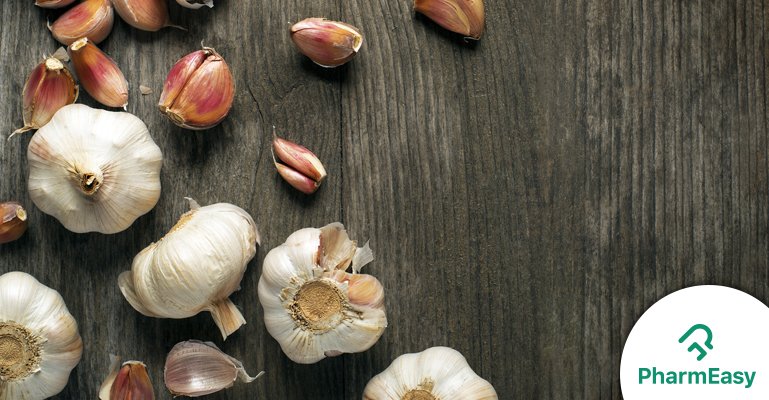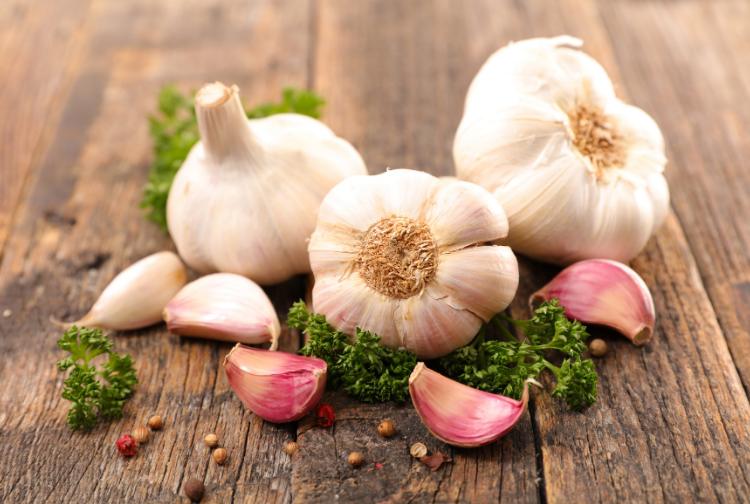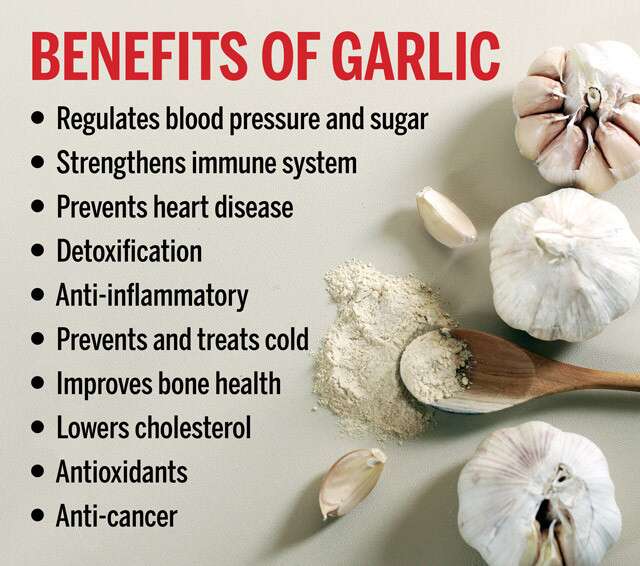Garlic offers numerous health benefits, including reducing E. Coli bacteria growth, preventing urinary tract and kidney infections, promoting wound healing, and supporting hair, bone, and liver health. Its antioxidant properties combat free radicals, which can contribute to various diseases, such as heart disease, cancer, and Alzheimer’s.
Consuming raw garlic on an empty stomach is recommended to maximize its benefits, as it contains Allicin, which helps in thinning the blood and reducing cholesterol levels. Additionally, garlic is known for its ability to fight bacteria, viruses, fungi, and parasites, while also improving immune function, heart health, and brain health.
Its anti-inflammatory properties and potential to regulate inflammation further contribute to its overall health benefits.
Introduction To Garlic’s Medicinal Qualities
Unlock the potential of garlic’s medicinal qualities for a myriad of health benefits. From reducing bacterial growth to promoting hair growth and boosting bone health, garlic is a versatile ally in maintaining overall well-being. Its antioxidant-rich properties combat free radicals, potentially warding off heart disease, cancer, and Alzheimer’s.
Garlic is a popular herb that has been used for its medicinal properties for centuries. It is known for its strong flavor and aroma, which comes from its sulfur compounds. Garlic is packed with several key nutrients and bioactive compounds that offer a range of health benefits. In this article, we will explore the historical uses of garlic in traditional medicine and the key bioactive components present in garlic.Historical Uses Of Garlic In Traditional Medicine
Garlic has been used for medicinal purposes for thousands of years. Ancient civilizations such as the Egyptians, Greeks, and Romans used garlic for its therapeutic properties. It was used to treat a wide range of ailments, including infections, digestive disorders, and respiratory issues. Garlic was also believed to have mystical powers and was used to ward off evil spirits. In traditional Chinese medicine, garlic was used to improve circulation, boost immunity, and treat various health conditions. In Ayurvedic medicine, garlic was used to improve digestion, reduce inflammation, and treat skin conditions.Key Bioactive Components In Garlic
Garlic contains several key bioactive components that offer a range of health benefits. One of the most important is allicin, which is responsible for garlic’s strong odor and flavor. Allicin has been shown to have antibacterial, antiviral, and antifungal properties. It is also a potent antioxidant that helps protect the body from damage caused by free radicals. Garlic also contains other sulfur compounds, such as diallyl sulfide and diallyl disulfide, which have been shown to have anti-inflammatory and anticancer properties. Additionally, garlic is a good source of vitamins C and B6, manganese, and selenium, all of which are important for overall health and wellbeing. In conclusion, garlic is a powerful herb that has been used for its medicinal properties for thousands of years. It is packed with several key nutrients and bioactive compounds that offer a range of health benefits. By incorporating garlic into your diet, you can boost your immune system, improve circulation, and reduce inflammation, among other benefits.
Credit: pharmeasy.in
Cardiovascular Health Enhancements
Garlic has been revered for centuries for its various health benefits, including its positive impact on cardiovascular health. Let’s delve into the specific ways in which garlic promotes cardiovascular well-being.
Garlic’s Role In Cholesterol Management
Consuming garlic regularly has been linked to a reduction in total cholesterol levels, particularly the harmful LDL cholesterol. Studies have shown that the sulfur compounds in garlic can help regulate cholesterol synthesis in the liver, contributing to improved lipid profiles.
Impact On Blood Pressure And Heart Disease
Garlic has demonstrated the ability to lower blood pressure, which is a significant risk factor for heart disease. The compounds in garlic aid in vasodilation, promoting relaxation of blood vessels and reducing blood pressure. Additionally, garlic’s anti-inflammatory and antioxidant properties play a role in protecting the heart from oxidative stress and damage.
Immune System Support
Garlic is a potent natural remedy that has been used for centuries to boost the immune system and promote overall health. Its antiviral and antibacterial properties make it a valuable addition to any diet.
Garlic’s Antiviral And Antibacterial Properties
Garlic contains compounds that have strong antiviral and antibacterial effects. These properties help the body fight off infections and illnesses, supporting a healthy immune system.
Enhancing Disease Resistance With Garlic Consumption
Regular consumption of garlic can enhance the body’s disease resistance capabilities. By incorporating garlic into your diet, you can strengthen your immune system and reduce the risk of falling ill.
Anti-cancer Properties
Studies Linking Garlic To Reduced Cancer Risk
Research has shown that consuming garlic regularly may be associated with a reduced risk of certain types of cancer. Studies have indicated that individuals who include garlic in their diets may have a lower likelihood of developing various forms of cancer, including stomach, colorectal, and prostate cancer.
Mechanisms Of Garlic’s Anti-carcinogenic Effects
Garlic contains organosulfur compounds, such as allicin, which are believed to contribute to its anti-carcinogenic effects. These compounds have been found to inhibit the activation of cancer-causing substances, enhance DNA repair, induce apoptosis (programmed cell death) in cancer cells, and impede the formation of new blood vessels that support tumor growth.
Garlic For Digestive Health
Garlic has been long celebrated for its numerous health benefits, including its positive effects on digestive health. From improving gut health and digestion to playing a role in detoxification processes, garlic is a powerhouse for maintaining a healthy digestive system.
Improving Gut Health And Digestion
Garlic is known for its ability to promote the growth of beneficial gut bacteria, which contributes to a healthy digestive system. It aids in the breakdown of food and absorption of nutrients, supporting overall digestive function.
Garlic’s Role In Detoxification Processes
Garlic contains sulfur compounds that support the body’s natural detoxification processes. These compounds assist in the elimination of toxins and heavy metals from the body, promoting a healthy and well-functioning digestive system.
Skin And Hair Benefits
The health benefits of garlic extend beyond culinary uses to offer remarkable advantages for skin and hair health. Harnessing the power of garlic can promote glowing skin and luscious hair.
Using Garlic For Skin Health
Garlic is a potent natural remedy for various skin conditions due to its antibacterial and antifungal properties. It can aid in treating acne, eczema, and fungal infections.
Benefits For Hair Growth And Scalp Health
Garlic stimulates hair growth by enhancing circulation to the scalp and nourishing hair follicles. It helps in combating dandruff and strengthening hair strands, leading to healthier hair.
Potential Side Effects And Precautions
While garlic is renowned for its numerous health benefits, it’s essential to be mindful of potential side effects and precautions associated with its consumption. Understanding the common adverse reactions to garlic and adhering to guidelines for safe consumption can help maximize its benefits while minimizing any negative effects.
Common Adverse Reactions To Garlic
Garlic is generally safe for consumption, but some individuals may experience adverse reactions, especially when consumed in excessive amounts. Common adverse reactions to garlic may include:
- Digestive discomfort such as heartburn and indigestion
- Bad breath and body odor
- Allergic reactions in some individuals
- Potential interactions with certain medications
Guidelines For Safe Garlic Consumption
To ensure safe consumption of garlic and minimize potential side effects, consider the following guidelines:
- Limit intake to recommended daily amounts, typically 2-4 cloves for adults
- Avoid consuming excessive amounts of raw garlic to prevent digestive discomfort
- Consult with a healthcare professional, especially if you have underlying health conditions or are taking medications
- Consider garlic supplements under the guidance of a healthcare provider
By following these guidelines, you can enjoy the health benefits of garlic while minimizing the risk of adverse effects.

Credit: www.vcuhealth.org
Optimal Ways To Consume Garlic
Unlock the full health potential of garlic by consuming it raw on an empty stomach to maximize the benefits of Allicin, which aids in blood thinning and reducing cholesterol levels. Incorporate garlic in your daily diet to boost immunity, heart health, and overall well-being.
Garlic is an incredibly versatile ingredient that can be consumed in many different ways, each providing its own unique benefits. Whether you prefer it raw or cooked, there are optimal ways to consume garlic that will help you reap its full health benefits.Raw Vs. Cooked Garlic: What’s More Beneficial?
Raw garlic contains a compound called allicin, which has been shown to have powerful health benefits, including reducing cholesterol levels and thinning the blood. However, cooking garlic can also be beneficial, as it can help to release other beneficial compounds, such as antioxidants.Daily Recommendations And Best Practices
To get the most out of your garlic consumption, it is recommended to consume at least one clove of garlic per day. This can be done by adding raw garlic to your meals, or by cooking it into your favorite recipes. It is important to note that consuming too much garlic can have side effects, such as bad breath and digestive issues, so it is best to stick to the recommended daily amount. To ensure optimal garlic consumption, it is also recommended to crush or chop your garlic before consuming it. This helps to release the beneficial compounds and makes them more easily absorbed by the body. In conclusion, whether you prefer your garlic raw or cooked, there are many optimal ways to consume this versatile ingredient to reap its full health benefits. By following daily recommendations and best practices, you can easily incorporate garlic into your diet and enjoy its many health benefits.
Credit: merlionnaturals.com.au
Frequently Asked Questions
What Are The Health Benefits Of Garlic?
Garlic offers numerous health benefits, including reducing the risk of infections, promoting hair growth, and improving bone and liver health. It also has the potential to combat urinary tract infections and prevent kidney infections.
What Happens If You Eat Garlic Every Day?
Eating garlic every day can boost immunity, lower cholesterol, and support heart health. It also has anti-inflammatory and antimicrobial properties. However, consuming excessive amounts may lead to digestive issues and bad breath. It’s best to eat it in moderation for optimal health benefits.
What Diseases Does Garlic Fight?
Garlic fights diseases such as heart disease, cancer, and Alzheimer’s due to its antioxidant properties.
What Is The Healthiest Way To Eat Garlic?
For maximum health benefits, eat raw garlic on an empty stomach to preserve Allicin, which thins blood and lowers cholesterol levels.
Conclusion
Incorporating garlic into your daily diet can have a multitude of health benefits. From fighting off infections and promoting hair growth to supporting bone and liver health, garlic is a powerhouse of nutrients. Remember to consume it in its raw form for maximum benefits.
Embrace the power of garlic for a healthier you!

